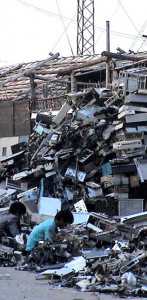The Fellows Journal is a forum for the current Library Publishing Coalition fellows to share their experiences and raise topics for discussion within the community. Learn more about the Fellowship Program.
In addition to my duties as a scholarly communication librarian, one of my roles at the University of San Francisco is liaison to the Migration Studies program. It’s a relatively new program in a relatively new field, so search terms are still evolving. For example, one of the common roadblocks that students encounter is that research data is available under “refugees” rather than “migrants.” This search term confusion is easily remedied, but there are also problematic descriptors such as “illegal” and “undocumented”. One of the questions that came up this past year was, What do you call someone who has valid legal immigration status but who is deported or detained? (People in the class agreed “illegal” is unacceptable, and “undocumented” is inaccurate.) Since many of the students in the program have a personal stake in these issues, these conversations around naming are not taken lightly.
In addition to these discussions in the classroom, naming and authority are, of course, important to librarianship as well. More recently, I have been thinking about “accessibility” and “sustainability” as terms that are heavily used both in my work as a scholarly communications librarian and more broadly outside of my professional niche.
Naming Access
Library publishers, in our comparatively brief history, are not much better than traditional publishers and the rest of academia in making our output accessible to people with disabilities.[1] With that in mind, over the past few months, I’ve been working on a subcommittee of the LPC Ethical Framework for Library Publishing Task Force to research and make recommendations on how library publishers can better provide accessibility not just in our published output, but also for authors and publishing professionals.
Unexpectedly, all three of us on the subcommittee found, mixed in with articles on how to make websites and PDFS accessible, articles on the open access movement that had nothing to do with accessibility and disabilities. This should not have come as a surprise, as “access” is the root word for both. But these search results led us to wonder, how has the open access movement co-opted, diluted, or simply just made things difficult for academics and advocates working in accessibility and disabilities? At the very least, it’s clear that the open access movement came out of communities that were primarily able-bodied, if not in demographics, in culture, so that the impact on the accessibility community was not considered.
What then, is the solution to this search term overlap? I offer a straightforward one: That the open access community expand the definition of “access” so that it matches the original one, that we transform our practices so that, as library publishers, we do not consider our open access publications complete until our materials offer complete access. After all, if the driving motivation, at the beginning of the open access movement, was the prohibitive cost of scholarly materials, we should then consider how those costs are exponentially higher for anyone with one or more disabilities.
Fortunately, there are efforts underway to effect this change, not just in the LPC accessibility subcommittee, but also in the open education community,[2] to make people more aware of the many tools, templates, and best practices documentation that exist to help make what is open access truly accessible.
Naming Sustainability

The term sustainability has a longer history in technology; it is less discipline-specific and therefore less problematic. But similarly, when we in scholarly communication and library publishing talk about sustainability, our focus is on data preservation and metadata schemas, not environmental sustainability. And yet, even within librarianship, the term is most commonly used by the American Library Association to refer to environmental sustainability.[3] This disconnect between scholarly communication and the rest of librarianship is shortsighted. Library publishing relies heavily on technology, and therefore is complicit in the problems created by modern technology, from conflict metals to e-waste pollution to inequitable labor.
Environmental sustainability should be considered when we talk about scholarly communication sustainability because it does have long-term impact on the viability of our work in two ways: 1) We are contributing to the destruction of our planet and the supply chains that enable our work and 2) We are perpetuating colonialist infrastructures and behaviors in taking and spoiling while claiming to do good in this world.
I will admit, solving for the problem of environmental sustainability in library publishing (let alone in our daily lives) is less straightforward than making our publications completely accessible! But I think we can approach it in much the same way students on campuses approached divestment from big oil and prison systems, by asking technology providers on our campuses, what are your environmental sustainability policies? What are your labor practices? How are you contributing or alleviating e-waste and pollution? The inequitable distribution of technology’s up and down sides are connected to the economics of access, which privilege so many of us in North America. Our institutions are lucrative contracts for both hardware and software businesses, and I believe that we are within our rights as customers to ask these questions.
Looking Ahead
If you’d like to explore these issues and others highlighted by this year’s LPC fellows, Reggie Raju and I will be participating in the Library Publishing Forum May 21-23, 2018, at the University of Minnesota, Twin Cities.
Is there a topic you’d like to see the library publishing community discuss? Submit a proposal for the Library Publishing Forum! The call for proposals is open through January 19, 2018.
[1]Higher Ed Accessibility Lawsuits, Complaints, and Settlements http://www.d.umn.edu/~lcarlson/atteam/lawsuits.html Accessed December 4, 2017
[2] Kaela Parks, “The Intersection of Accessibility and Open Educational Resources”, Open Oregon Educational Resources, http://openoregon.org/the-intersection-of-accessibility-and-open-educational-resources/ Accessed December 4, 2017
[3] Sustainability Round Table of ALA, “Resolution on the Importance of Sustainable Libraries”, http://connect.ala.org/files/Sustainable_Libraries_resolution.doc, Accessed December 4, 2017
